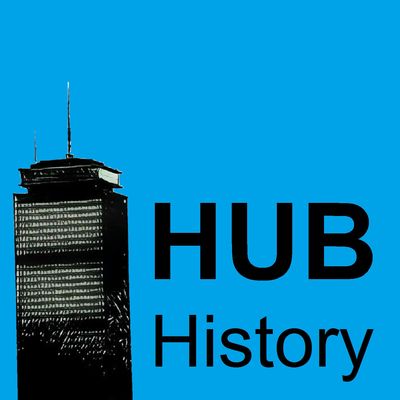Where two history buffs go far beyond the Freedom Trail to share our favorite stories from the history of Boston, the hub of the universe.
http://HUBhistory.com
ED Leavitt, Fresh Water, and Steam Power (episode 137)
For centuries before the Quabbin reservoir opened, Boston struggled to provide enough clean, fresh water for its growing population. One of the solutions to this problem was a new reservoir built at Chestnut Hill in the 1880s. The pumping station at this reservoir was home to enormous steam powered pumping engines, and it’s preserved today as the Metropolitan Waterworks Museum. Eric Peterson joins us this week to talk about the history of Boston’s water supply, steam power, and a brilliant engineer who designed the steam pumps that provided Boston’s water.
Please support us on Patreon and check out the full show notes at: http://HUBhistory.com/137/
ED Leavitt- A posthumous profile of Leavitt from the Journal of the Boston Society of Civil Engineers.
- Leavitt’s obituary in the Cambridge Chronicle.
- Another profile in the Proceedings of the American Academy of Arts and Sciences.
- Model of a Leavitt engine held by the Harvard Collection of Historical Scientific Instruments.
- ED Leavitt’s papers are at the Smithsonian, including a few pictures.
If you enjoyed this episode, be sure to visit the Metropolitan Waterworks Museum. It’s really a terrific museum, and one that most people never see.
Boston Book ClubOur pick for the Boston Book Club this week is called Eden on the Charles, the Making of Boston, by Michael Rawson. You may have noticed that I’m a bit of an infrastructure nerd, and this is one of my go-to books about the infrastructure that makes up Boston. We’ve used this book as a source for our shows about annexation, perambulating the bounds, and the Mother Brook. It’s both a history of 400 years of urban planning in Boston, and the mirror image of that, which is the environmental history of the city.
Here’s how the publisher’s website describes the book:
Drinking a glass of tap water, strolling in a park, hopping a train for the suburbs: some aspects of city life are so familiar that we don’t think twice about them. But such simple actions are structured by complex relationships with our natural world. The contours of these relationships—social, cultural, political, economic, and legal—were established during America’s first great period of urbanization in the nineteenth century, and Boston, one of the earliest cities in America, often led the nation in designing them. A richly textured cultural and social history of the development of nineteenth-century Boston, this book provides a new environmental perspective on the creation of America’s first cities.
Eden on the Charles explores how Bostonians channeled country lakes through miles of pipeline to provide clean water; dredged the ocean to deepen the harbor; filled tidal flats and covered the peninsula with houses, shops, and factories; and created a metropolitan system of parks and greenways, facilitating the conversion of fields into suburbs. The book shows how, in Boston, different class and ethnic groups brought rival ideas of nature and competing visions of a “city upon a hill” to the process of urbanization—and were forced to conform their goals to the realities of Boston’s distinctive natural setting. The outcomes of their battles for control over the city’s development were ultimately recorded in the very fabric of Boston itself. In Boston’s history, we find the seeds of the environmental relationships that—for better or worse—have defined urban America to this day.
If you want to know more about how the development of Boston’s systems of water and sewage, its filled land and dredged harbor created today’s sprawling city from the puritan village on a peninsula that it evolved from, check out the book.
Upcoming Historical EventAnd for our upcoming event this week, we have a talk at the main library in Copley Square this Thursday, June 20. Melnea Cass was a prolific activist in the early and mid-20th century who became affectionately known as “the First Lady of Roxbury.” Over a long career, she worked on everything from women’s suffrage to the settlement house movement to school desegregation. Early in her career, she worked directly with NAACP cofounder William Monroe Trotter, who we discussed in our show about Black Boston’s protests against the racist film Birth of a Nation. Later in her career, she would be president of the NAACP Boston chapter. Before her death in 1978, she had been granted at least three honorary doctorates by Boston schools, a swimming pool and skating rink had been named after her, and mayor John Collins had declared a citywide Melnea Cass day.
This event focuses on the very earliest days of her career as an activist, though. When she was 21 years old, Melnea Jones married Marshall Cass, a soldier who was soon deployed to Europe during the First World War. While Marshall was away, Melnea moved in with her new mother-in-law, Rose Brown. Rose was a fierce suffragist and an early member of the NAACP. Through Rose’s club memberships, Melnea Cass met a group she later described as “women who we looked up to, who were leaders in the community, just simple leaders… They were simply people who lived in the community, who’d try to help you and tell you things to do… just good neighbors, that’s all.”
These role models inspired a lifetime of service to her community, and they’re the topic of Thursday’s talk, titled Bridging the Gap. Here’s how the library website describes it:
Melnea Cass is well known for organizing the sit-ins over school segregation in Boston and leading the fights over urban renewal and highway construction in the South End and Roxbury. However a young Melnea Cass in 1919 first learned community organizing from her mother-in-law Rosa Brown. Join us to learn how Rosa Brown helped guide Melnea Cass.
